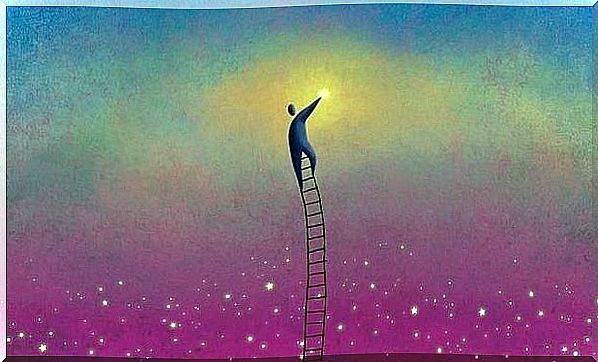When You’ve Hit Rock Bottom You Can Only Go Up

Sometimes our lives tumble down a precipice that seems to be endless.
We have hit the bottom emotionally, physically, socially and professionally, and we remain hidden here, with fear and sadness that resist and turn into the premise of various moral disturbances.
Everyone has serious problems, has lived through tragedies and even tragedies, but the qualifiers that are given to them have more to do with the way in which the person digests them than with their presence in oneself.
Everyone is strong and has a plan until they are in pain. We don’t end up without a plan, but we have to rethink it. When you hit rock bottom, you can feel extremely lost.
In his explanation of depression, Beck questions certain irrational thoughts by evoking the concept of “downward arrow” and that of “paradoxical amplification”.
If we consider these techniques and adapt them to our own experience, we will realize that when we have hit rock bottom the only thing we can do is go back up.
Realize that error is fear
Everyone is afraid of adverse events that they may experience but when you have experienced great pain and you feel that you have hit rock bottom, you are aware that there are only two options: continue in this almost vegetative and painful state, or go up the slope. It is up to you.

The “downward arrow” is a cognitive therapy technique that teaches you to select a negative thought and answer the question: If that thought were true, what would it mean to you? The answer would be another negative thought.
It would take successive questions (by drawing downward arrows), with which would emerge in the light of counterproductive beliefs (perfectionism, need for approval, fears etc.)
If you are immersed in a painful thought and think that you have hit rock bottom and nothing is resolved, you need to explain what this means to you and normally another negative thought will appear.
For example, when faced with someone who has lost one of their children and feels they will never be able to care for others, ask: What would the illness of another child mean to you?
There will surely appear another feeling of pain and so successively, until an even more catastrophic vision of life.
Even here, despite the hardness of the exercise and the lived experience, that person will find that he can take it and continue to live. It is his thought that amplifies the pain, more than what actually happens.
Once you get here, you can realize that even having lived through a devastating event, you can experience worse ones, because nothing is certain in life.
Even the dynamics of defeatist thoughts can trigger them: it can cause the loss of a job, or the estrangement of other children. Ultimately, losing what is important to us.
At this point, the person is aware that they are on the floor in despondency, but they do not want to go down into the cellar.
All you have to do is go back up and she’ll do it more easily than she thinks. She has little to lose, only fear.
We amplify the sentences and we see the absurdity of our current attitude
Paradoxical amplification is a cognitive technique in which the patient is taught to exaggerate negative thoughts instead of trying to curb or control them.
Paradoxically, these thoughts can seem absurd and meaningless.
Obviously, this technique should be used for negative thoughts associated with events of relative gravity (addressing fearful thoughts of the future after losing a child is not possible with this technique).
With paradoxical amplification, we consider the possibility that the patient is not in the worst state in which he could be regarding his suffering.
He may feel lonely because he’s just broken up with his partner, but he’s far from being in the worst loneliness possible, one where he couldn’t even rely on his friends and family.
We then carry our pain to terror and tragicomedy and we laugh at the absurdity of our catastrophism.
Suffering makes us wise and resilience makes us strong
There is nothing in a person’s life that can take them in if they don’t allow it.
We set the limits, the times and a more or less attentive ear to the harmful comments of people who give their opinion without having experienced anything similar. Everyone has their own way.
There are people who go through bitter times and end up making others bitter.
There are others who turn their bitterness into the antithesis of what they want in their life: they know what it is and don’t want it for themselves or for others.
They are luminous people, born from the gray of their existence.

When we go beyond the limits of ridicule, pain, humiliation, judgment, disappointment… when we go beyond them and see that we have suffered too much, we reach the true meaning of our existence.
It is only when we have hit rock bottom and understood the process of things, that we realize that the only possible option is to go back up.
We come face to face with the certainty that we will never act out of ego again, but for our genuine personal well-being.
We withdraw from competition with others, to simply strive for our own dreams.
After so many bad times and so much pain, the best is bound to come.
Take a step, get out of the complaint, go for a living and let it happen. You have fallen so low that you can only go back up.








